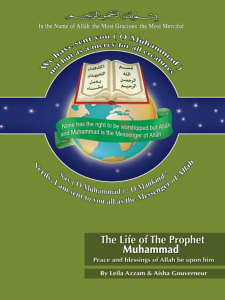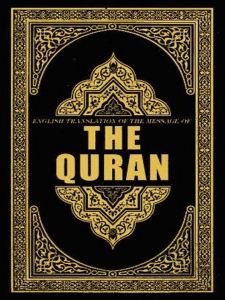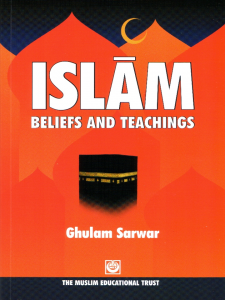The status of women in Islam, is an issue that is pertinent in present times; both due to the divergence of cultural practices in the Muslim world from the Islamic perspective and the erroneous perception in the West, that Islam subjugates womenfolk.
A dispassionate study of the primary sources of Islam, along with an analysis of the position of women in societies where
Islam was implemented, actually proves that for women Islam is a special blessing.
“Prior to Islam,” write the authors of The Cultural Atlas of Islam, “a woman was regarded by her parents as a threat to family honor and hence worthy of burial alive at infancy. As an adult, she was a sex object that could be bought, sold and inherited. From this position of inferiority and legal incapacity, Islam raised women to a position of influence and prestige in family and society.”
The rights and responsibilities of women are equal to those of men but they are not necessarily identical. This difference is understandable because men and women are different, in their physiological and psychological make-up. With this distinction in mind, there is no room for a Muslim to imagine that women are inferior to men. Thus it is perhaps more apt to refer to the Islamic approach on gender relations, as one of “equity” rather than the commonly used word “equality”, which could be misunderstood to mean equality in every minute aspect of life, rather than overall equality.
The Spiritual Aspect
The sacred text of the Glorious Qur’an and the history of early Muslims bear witness to the fact that women are considered as vital to life as men.
Islam refuted the idea that Eve tempted Adam to disobey God, and thus caused his downfall. The Qur’an says that they both disobeyed, and negates the idea that women are a source of evil.
In a world where women were no more than objects of sexual gratification for men, and at a time when the religious circles argued over whether women were human or not, possessing souls, Islam proclaimed:
“O mankind! We created you from a single (pair) of a male and a female.”[Al-Qur’an 49:13]
“O Mankind! Reverence your Guardian-Lord, Who created you from a single person, created of like nature his mate, from them scattered countless men and women. Fear Allah, through whom you demand your mutual rights and reverence the wombs (that bore you), for Allah ever watches over you.”
[Al-Qur’an 4:1]
Men and women are of the same family, and as such have similar rights and duties, and their Lord promises them in the Glorious Qur’an:
“Never will I waste the work of a worker among you, whether male or female, the one of you being from the other.”
[Al-Qur’an 3:195]
Thus, in the Islamic tradition, a woman has an independent identity. She is a responsible being in her own right and carries the burden of her moral and spiritual obligations.
The Social Aspect
Women have as much right to education as men do. Almost fourteen centuries ago, Prophet Muhammad (p) declared that the pursuit of knowledge is incumbent on every Muslim, male and female. This declaration was very clear and was largely implemented by Muslims throughout history.
Islam elevated the position of women in society and treated them on an equal footing with men, and in some cases, as a mother for instance, clearly gave them precedence over men. Thus when a man asked Prophet Muhammad (p): “Who is most entitled to be treated with the best companionship by me?” the Prophet (p) replied, “Your mother.” The man asked, “Who is next?” The Prophet (p) said, “Your mother.” Again the man asked, “Who is next?” The Prophet (p) repeated, “Your mother.” The man asked for a fourth time, “Who is next?” The Prophet (p) then replied, “Your father.”
On another occasion, when a man came to the Prophet (p), and expressed the desire to join a military expedition, the Prophet (p) asked him if he had a mother. When he replied that he had, the Prophet (p) advised him, “Stay with her, for Paradise is at her feet.”
As daughters, women have a right to just and equitable treatment from their parents. The Prophet(p) gave glad tidings to those who did not insult their daughters or favored sons over daughters.
A woman has the right to accept or reject marriage proposals, and her consent is a prerequisite to the validity of the marriage contract. A marriage is based on mutual peace, love and compassion. Dr. Jamal Badawi, a Canadian Islamic scholar, states in his book Gender Equity in Islam:
“The husband is responsible for the maintenance, protection and overall leadership of the family within the framework of consultation and kindness. The mutuality and complementarity of husband and wife does not mean ’subservience’ by either party to the other. Prophet Muhammad (p) helped with household chores, although the responsibilities he bore and the issues he faced in the community were immense.”
The responsibility of maintaining social and moral values lies on both men and women. Both must refrain from all deeds and gestures that might stir the passions of people other than their legitimate spouses or cause evil suspicion of their morality.
Women are entitled to freedom of expression just as men are. Among the early Muslims, women participated in public life, especially in times of emergencies. It is reported in the Qur’an and in history that women not only expressed their opinion freely but also argued and participated in serious discussions with the Prophet (p) himself as well as with other Muslim leaders. They were not shut behind iron bars or considered worthless.
The Economic Aspect
Islam grants women equal rights to contract, to enterprise, to earn and possess independently. A woman’s life, her property and her honor are as sacred as those of a man. If she commits any offense, her penalty is no less or more than of a man’s in a similar case. If she is wronged or harmed, she gets due compensation equal to what a man in her position would get.5
Islam has given women a share of inheritance. Before Islam, women were not only deprived of that share, but were themselves considered as property to be inherited by men. Out of that transferable property Islam made an heir, acknowledging the inherent individuality of women. Whether the woman is a wife or mother, a sister or daughter, she receives a certain share of the deceased kin’s property, a share that depends on her degree of relationship to the deceased and the number of heirs. This share is hers, and no one can take it away or disinherit her. Even if the deceased wishes to deprive her by making a will to other relations or in favor of any other cause, the Law will not allow him to do so.
Women are exempt from all financial liabilities. As a wife, a woman is entitled to demand of her prospective husband a suitable dowry that will be her own. She is entitled to complete provision and total maintenance by the husband. She does not have to work or share with her husband the family expenses. She is free to retain, after marriage, whatever she possessed before it, and the husband has no right whatsoever to any of her belongings. As a daughter or sister she is entitled to security and provision by the father and brother respectively. That is her privilege. If she wishes to work or be self-supporting and participate in handling the family responsibilities, she is quite free to do so, provided her integrity and honor are safeguarded.
The Rights and Duties of Women in Islam
1. Education
The Messenger of Allah (p.b.u.h.) once said: “Acquiring knowledge is compulsory for every Muslim. (At-Tabarani)
This narration applies equally to men and women. “Knowledge” in this context refers primarily to knowledge of the Holy Quran and Sunnah as no Muslim should be ignorant of his or her Faith, but it also covers other areas of general education, which can contribute to the welfare of civilization. It is precisely the ignorance about their religion among Muslims that has led to men oppressing women because they believe it is permitted, women not demanding their God-given rights because they are ignorant of them, and children growing up to perpetuate their parents’ follies. Throughout Islamic history, men and women both earned respect as scholars and teachers of the Faith. The books of Rijal (Reporters of Hadith) contain the names of many prominent women, beginning with Aishah and Hafsah.
2. Worship
Both men and women are the slaves of Allah and have a duty to worship and obey Him. Men and women have to pray, fast, give charity, go on pilgrimage, refrain from adultery, avoid the prohibited, enjoin the good and forbid the evil, and so on. Because of women’s roles as mothers, a role which does not end at a specific time but is a round the-clock career, they have been exempted from attending the Mosque for the five daily prayers or for Jumuah (Friday) prayer. Nevertheless, if they wish to attend the Mosque, no one has the right to stop them.
3. Charitable Acts
Men and women are both encouraged to give charity, and there is nothing to stop a woman giving charity from her husband’s income. Aishah reported that the Messenger of Allah said: “A woman will receive reward (from Allah) even when she gives charity from her husband’s earnings. The husband and the treasurer (who keeps the money on the husband’s behalf) will also be rewarded, without the reward of any of them decreasing.” Asmaa once said to the Prophet “O Messenger of Allah, I have nothing except what Zubair (her husband) brings home.” The Prophet told her: ‘O Asmaa give in charity. Don’t lock it lest your subsistence is locked.’”
4. The Right to Own Wealth and Property
A woman has the right to keep her property or wealth, whether earned or inherited, and spend it as she may please.
This right was granted to Western women only very recently, and the women of India had to wait until 1956 for a right which Muslim women have always taken for granted. Concerning the right to one’s earnings, the Holy Quran says:
“And wish not for the things in which Allah has made some of you excel the others. For men there is reward for what they have earned, (and likewise) for women there is reward for what they have earned, and ask Allah of His Bounty. Surely, Allah is Ever All-Knower of everything.” (V. 4:32)
5. Freedom to Express One’s Opinion
Few societies exist in which the ordinary citizen can confront the ruler face to face and challenge his policies. Even fewer societies allow women to be so bold, yet the Islamic ideal has always been open and accessible. This freedom of expression is aptly demonstrated by a famous incident involving Omar the second Rightly- Guided Caliph. Omar was once standing on the pulpit, severely reprimanding the people and ordering them not to set excessive amounts of dower at the time of marriage. A woman got up and shouted, “Omar, you have no right to intervene in a matter which Allah the All-Mighty has already decreed in Quran:
“But if you intend to replace a wife by another and you have given one of them a Qintar (of gold, i.e., a great amount as Mahr bridal money), take not the least bit of it back; would you take it wrongfully without a right and (with) a manifest sin?” (V.4:20)
After being reminded of this Verse, Omar withdrew his order, saying, “I am in the wrong and she is correct.”
6. Participation in Jihad
The battlefield is a place, which frightens many men let alone women. Due to the aggressive and violent nature of war, only men have a duty to participate in Jihad (holy fighting in Allah’s cause) while women are exempted. A woman once asked the Prophet to allow women to go on Jihad with men because of its excellence and the unlimited reward promised to Mujahideen (Muslim fighters) in the Hereafter. The Prophet replied: “For them is a Jihad without fighting,” which referred to the Hajj and Umrah. Nevertheless the Prophet did permit women to nurse the injured and supply provisions to the Mujahideen at some battles. A woman from the tribe of Ghifar came with a large group of women to the Prophet when he was preparing to leave for the conquest of Khaibar. She said: “O Allah’s Messenger, we wish to accompany you on this journey so that we may nurse the injured and help the Muslims.” The Prophet responded, ‘Come may Allah shower His blessings upon you.’” Umm Atiyyah an Ansari woman once said:
“I have participated in seven battles with the Prophet. I used to guard the camels of the Mujahideen in their absence, cook the food, treat the injured and care for the sick.”
Muadh Bin Jabal reports that his cousin Asmaa Bint Yazid killed nine Roman soldiers with a tent-pole during the battle of Yarmuk.
7. Freedom to Choose Her Husband
The guardian of the girl whether her father, brother or uncle plays an important role in her marriage such as finding a suitable match for her. But under no circumstance does this allow him to force his choice on her against her wishes. She is free to accept or reject his choice, or make her own choice. A woman named Khansa Bint Khidam once came to the Prophet and complained:
“My father has forced me to marry my cousin in order to raise his own status (in the eyes of the people).” The Prophet told her that she was free to dissolve this marriage and choose whomever she wished to marry. She replied, “I accept my father’s choice, but my aim was to let the women know that fathers have no right to interfere in the marriage.” (Ahmad, Nasa’i and Ibn Majah)
8. A Woman’s Guarantee in War is Acceptable
If a woman gives surety to a war-captive or gives him shelter, her guarantee will be accepted. Umm Hani, a cousin of the Prophet, said to him after the conquest of Makkah: “I have given shelter to two of my in-laws.” The Prophet said: ‘O Umm Hani, we have given shelter to whom you have given shelter.’” According to another narrative, Umm Hani gave shelter to a man but her cousin Ali tried to kill the man. She complained to the Prophet who endorsed her act of giving shelter to the man.
9. The Right to Custody of Children
Divorce is especially painful and difficult when the couple has had children, and awarding custody to either party involves difficulties. According to Western law, both father and mother have to prove to the Court that they are more capable of looking after the children, and this often involves maligning the other party in order to strengthen their own claims to custody. Islamic law has its own clear decision on this issue. Custody of young boys and girls goes to the mother. The son stays with his mother until he is about seven or nine years of age, after which he is looked after by the father. The daughter remains with her mother until she gets married. The exception is when the mother herself re-marries, in which case custody may be awarded to someone else such as the girl’s grandmother or aunt. This is based on the Prophet’s words to the divorcee:
“Your right to custody of the child is greater as long as you do not remarry.”
10. Participation in Extending Co-operation for the Promotion of Good and Elimination of Evil.
The Holy Quran deals with this subject in clear terms:
“The believers, men and women, are Awliyaa (helpers, supporters, friends, protectors) of one another; they enjoin (on the people) Al-Ma’ruf (i.e. Islamic Monotheism and all that Islam orders one to do), and forbid (people) from Al-Munkar (i.e. polytheism and disbelief of all kinds, and all that Islam has forbidden); they perform As-Salat (Iqįmat-as-Salat), and give Zakat, and obey Allah and His Messenger. Allah will have His Mercy on them. Surely, Allah is All-Mighty, All-Wise.” (V. 9:71)
Hijab (Head Cover)
American Muslim women today are rediscovering the pristine Islam as revealed by Allah, (God), to the Prophet Muhammad (pbuh1), more than 1,400 years ago, but without any of the contradictions of ancestral culture. Consequently they are essentially engaging in a life-long exercise of rediscovering their own selves – what it means to be a human, a Muslim, and more so, a Muslim woman. Wearing a head-covering (hijab) is an important part of their spiritual journey.
One of the most common questions today, asked by Muslims and non-Muslims alike, is: “Why do Muslim women cover their heads?” The answer is very simple – Muslim women observe hijab because Allah has told them to do so:
“O Prophet, tell your wives and daughters and the believing women to draw their outer garments around them (when they go out or are among men). That is better in order that they may be known (to be Muslims) and not
annoyed…” (Qur’an 33:59).
Modest clothing and hijab are precautions to avoid social violations. The following verses of the Qur’an highlight that this is not limited to women only.
“Say to the believing men that they should lower their gaze and guard their modesty; that will make for greater purity for them; and Allah is well acquainted with all that they do. And say to the believing women that they should lower their gaze and guard their modesty; and that they should not display their beauty and ornaments except what must ordinarily appear thereof; that they should draw their veils over their bosoms and not display their beauty except to their husbands…” (Qur’an 24:30-31)
According to Jabir ibn Abdullah, when he asked the Prophet (pbuh), about a man’s gaze falling inadvertently on a strange woman, the Prophet replied, “Turn your eyes away” (Muslim). In another tradition, the Prophet (pbuh) chided for looking again at a woman – he said, the second glance is from Satan.





